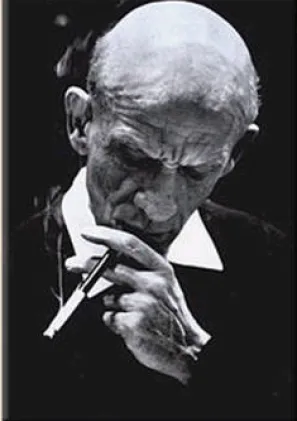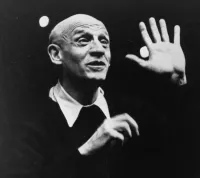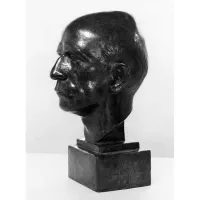Biography
1896 - 1960
“Only life suffered can transform a symphony from a collection of notes into a message of humanity.”
– Dimitri Mitropoulos
Born in Athens in 1896, Mitropoulos began composing by age 10. Equally drawn to religion and music, he had considered becoming a monk until he realized that it would mean a minimal amount of music in his life. Instead, music became his mission. His opera 'Soeur Beatrice' was presented in 1919 while he was still a student at the Athens Conservatory. He continued his education in Brussels and Berlin where, from 1921-25, he assisted at the Berlin State Opera. At a 1930 concert with the Berlin Philharmonic, Mitropoulos began his practice of conducting from the keyboard. In addition to his skill and energetic conducting style, he gained notoriety for his photographic memory for composition which allowed him to conduct without sheet music, even during rehearsals. In 1936 Mitropoulos made his U.S. debut with the Boston Symphony Orchestra. There he encountered music student Leonard Bernstein who had intended to become a pianist. The two men became romantically involved. Mitropoulos, who was older and already established in his career, had never entered into a contrived "lavender marriage" to deflect speculation about his homosexuality. But he advised Bernstein – who had decided to become a conductor thanks to Mitropoulos’s influence – to do so out of fear that the virulently anti-gay agenda sweeping the nation – thanks to the influence of Sen. Joseph McCarthy’s anti-Communism witch-hunt – would doom Bernstein’s promising career. After serving as the principal conductor of the Minneapolis Symphony Orchestra, Mitropoulos joined the New York Philharmonic in 1951 as its music director. In 1958 he was succeeded as the conductor of the Philharmonic by his former lover, Leonard Bernstein, who had taken his advice about marriage. A dynamic force in opera, Mitropoulos served as principal conductor and pianist of the Metropolitan Opera in New York until his death from heart failure, on November 2, 1960, while rehearsing Mahler's Third Symphony in Milan. He was 64.
1896 - 1960
“Only life suffered can transform a symphony from a collection of notes into a message of humanity.”
– Dimitri Mitropoulos
Born in Athens in 1896, Mitropoulos began composing by age 10. Equally drawn to religion and music, he had considered becoming a monk until he realized that it would mean a minimal amount of music in his life. Instead, music became his mission. His opera 'Soeur Beatrice' was presented in 1919 while he was still a student at the Athens Conservatory. He continued his education in Brussels and Berlin where, from 1921-25, he assisted at the Berlin State Opera. At a 1930 concert with the Berlin Philharmonic, Mitropoulos began his practice of conducting from the keyboard. In addition to his skill and energetic conducting style, he gained notoriety for his photographic memory for composition which allowed him to conduct without sheet music, even during rehearsals. In 1936 Mitropoulos made his U.S. debut with the Boston Symphony Orchestra. There he encountered music student Leonard Bernstein who had intended to become a pianist. The two men became romantically involved. Mitropoulos, who was older and already established in his career, had never entered into a contrived "lavender marriage" to deflect speculation about his homosexuality. But he advised Bernstein – who had decided to become a conductor thanks to Mitropoulos’s influence – to do so out of fear that the virulently anti-gay agenda sweeping the nation – thanks to the influence of Sen. Joseph McCarthy’s anti-Communism witch-hunt – would doom Bernstein’s promising career. After serving as the principal conductor of the Minneapolis Symphony Orchestra, Mitropoulos joined the New York Philharmonic in 1951 as its music director. In 1958 he was succeeded as the conductor of the Philharmonic by his former lover, Leonard Bernstein, who had taken his advice about marriage. A dynamic force in opera, Mitropoulos served as principal conductor and pianist of the Metropolitan Opera in New York until his death from heart failure, on November 2, 1960, while rehearsing Mahler's Third Symphony in Milan. He was 64.
Demography
Demography
Gender Male
Sexual Orientation Gay
Gender Identity Cisgender
Ethnicity Caucasian/White
Faith Construct Greek Orthodox
Nations Affiliated Greece Germany United States
Era/Epoch Cold War (1945-1991) Great Depression (1929-1939) Interwar Period (1918-1939)
Field(s) of Contribution
Music
Demography
Gender Male
Sexual Orientation Gay
Gender Identity Cisgender
Ethnicity Caucasian/White
Faith Construct Greek Orthodox
Nations Affiliated Greece Germany United States
Era/Epoch Cold War (1945-1991) Great Depression (1929-1939) Interwar Period (1918-1939)
Field(s) of Contribution
Music
Resources
Resources
Trotter, William R. "Mitropoulos, Dimitri." New Grove Dictionary of Music and Musicians. 2nd ed. Stanley Sadie, ed. London: Macmillan, 2001. 16: 764-765.
Trotter, William R. Priest of Music: The Life of Dimitri Mitropoulos. Portland, Ore.: Amadeus Press, 1995.
http://en.wikipedia.org/wiki/Dimitri_Mitropoulos
http://gayinfluence.blogspot.com/2012/12/dimitri-mitropoulos.html
https://www.chicagotribune.com/news/ct-xpm-1995-10-15-9510150112-story.html
https://www.classicalmpr.org/story/2018/05/10/the-untold-story-of-bernstein-in-minneapolis
http://theath.ca/arts-culture/gay-with-a-downbeat/
https://www.nytimes.com/2022/04/29/arts/music/dimitri-mitropoulos-sony-…
Resources
Trotter, William R. "Mitropoulos, Dimitri." New Grove Dictionary of Music and Musicians. 2nd ed. Stanley Sadie, ed. London: Macmillan, 2001. 16: 764-765.
Trotter, William R. Priest of Music: The Life of Dimitri Mitropoulos. Portland, Ore.: Amadeus Press, 1995.
http://en.wikipedia.org/wiki/Dimitri_Mitropoulos
http://gayinfluence.blogspot.com/2012/12/dimitri-mitropoulos.html
https://www.chicagotribune.com/news/ct-xpm-1995-10-15-9510150112-story.html
https://www.classicalmpr.org/story/2018/05/10/the-untold-story-of-bernstein-in-minneapolis
http://theath.ca/arts-culture/gay-with-a-downbeat/
https://www.nytimes.com/2022/04/29/arts/music/dimitri-mitropoulos-sony-…





